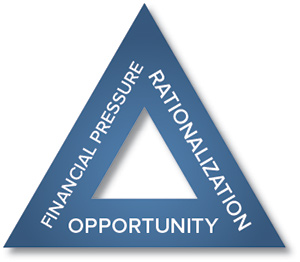As the devastating impact of the coronavirus continues to be felt across the globe, companies and their employees face persistent financial pressures and economic uncertainties. Paired with the massive disruptions to companies’ normal business processes and the adaption of business strategies to meet the “new normal,” the coronavirus pandemic has created the perfect storm for employee fraud. Companies must understand how these increased risks affect their organization and take steps to protect themselves from incurring fraud losses during these unprecedented times.
In its 2020 Report to the Nations, the Association of Certified Fraud Examiners (“ACFE”) estimated that organizations lose an average of 5% of their revenues to employee fraud each year. To protect your company, it is important not only to realize that fraud can occur, but also to understand how and why your Company could be impacted during this unprecedented time.
Over seven decades ago, Donald R. Cressey, a well-known criminologist, researched the behaviors of those convicted of embezzlement and developed the theory of the Fraud Triangle, a three-part model for explaining the factors that motivate employees to commit fraud. Under Cressey’s model, three distinct elements increase the likelihood of fraud: Financial Pressure to act, Opportunity for the act to occur, and Rationalization of fraudulent actions.
While companies face both financial and operational challenges created by the “new normal”, the coronavirus pandemic has strengthened all three elements of the Fraud Triangle, creating an environment that, left unchecked, will allow fraud to spread just like a virus. It is important for companies to evaluate how the pandemic has increased employees’ pressures, opportunities, and rationalization of fraudulent behavior so the organization can take precautions to protect itself.

Financial Pressure or Incentive
History teaches us that economic instability, such as that caused by the coronavirus, is a driving force behind the financial pressure to commit fraud. Throughout the pandemic, employees have been faced with reduced family income, health concerns, accumulating medical bills, and continuing economic uncertainty. As a result of the increased pressure caused by the coronavirus, employees have a greater incentive to commit fraud.
Opportunity
The pandemic shifted business processes and forced companies to quickly implement new procedures, often relaxing the internal controls that previously existed. These changes in operations, such as the implementation of a remote work force, digital approval processes, and the rapid approval of new vendors to avoid supply chain issues, decreased oversight and presented opportunities for fraud. Moreover, as organizations faced financial pressure and sought ways to cut costs, the non-revenue generating departments, such as finance, internal audit and compliance took the first hit. Accordingly, in many companies, at the same time employee incentives to commit fraud increased, the company’s defenses against fraud weakened, providing employees with a greater opportunity to commit fraud.
Rationalization
Ultimately, the chaos and uncertainty of the coronavirus crisis will allow many employees to rationalize fraudulent behavior, which might have otherwise been checked by an employee’s internal ethical code. Although perpetrators of fraud have always found a way to justify unethical behavior, recent events associated with the pandemic have provided additional reasons for fraudsters to rationalize their actions. For example, if an employer received Paycheck Protection Program (PPP) funds from the government, an employee may rationalize his embezzlement under the pretense that the company received free money while he received nothing.
Steps to Reduce Risks of Fraud
As companies continue adapting to the “new normal”, fraud prevention and detection may not be on top of one’s mind. However, history suggests that we will see a wave of fraud resulting from the pandemic in the years to come. The ACFE’s 2020 Report to the Nations reported that a lack of internal controls contributed to an alarming 1/3 of frauds, and that the presence of appropriate anti-fraud controls is linked to both quicker detection and lower fraud losses. Accordingly, companies should take steps now to put measures in place to reduce the risk of misconduct during this unprecedented time:
- Reassess internal controls to identify weaknesses associated with the virtual environment and the “new normal.” The ACFE’s Fraud Risk Management Scorecard [1] is a powerful tool to help companies make a preliminary assessment of their fraud risk.
- Develop controls to address any new or increased threats created by remote work arrangements and other virtual processes.
- Reevaluate cybersecurity threats associated with increased or modified remote and mobile network access.
- Maintain anti-fraud resources and staff and ensure a whistleblower program exists.
- Promptly investigate any allegations of wrongdoing.
- Set a “Tone at the Top” by maintaining communication and emphasizing the importance of each employee.
Withum is experienced in all facets of fraud prevention and investigation. In addition to being Certified Public Accountants (CPA), Withum’s Forensics, Investigations, and White-Collar Criminal Defense team has years of investigative experience and includes former Federal Bureau of Investigation and U.S. Secret service agents, Certified Fraud Examiners (CFE), Certified In Financial Forensics (CFF), and Certified Anti-Money Laundering Specialists (CAMS).
[1] https://www.acfe.com/coso-scorecard-home.aspx
Jessica or any member of the team with any questions on the risks you may face.
Forensics, Investigations and White Collar-Criminal Defense




